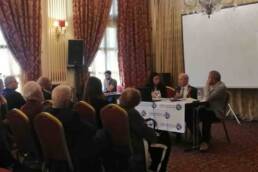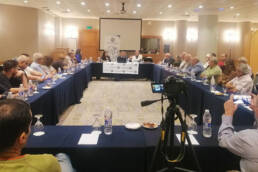The Center for Arab Unity Studies organized a seminar entitled “Deconstructing Colonial Knowledge Structures by National Critical Knowledge” on May 26 at the Crown Plaza Hotel in Beirut, as part of the activities of the Sixth Conference on Social Sciences organized by the Arab Council for Social Sciences (25-28 May 2023). The session included five interventions that dealt with five concepts about: colonial knowledge in the Maghreb countries, the role of the “intellectual” of modernity as a post-colonial phenomenon, the role of colonial knowledge in the colonization of Palestine, the role of the World Bank in distorting the development process in Palestine after Oslo, and finally a new understanding of Arab development. For this purpose, the session hosted the researchers: Mouldi Al-Ahmar, Hisham Al-Bustani, Ahmed Al-Dabash, Sabih Sabih, and the researcher at the center, Obada Kassar.
During her introduction to the session, Kassar explained the importance of interventions in dismantling the structures that constitute colonial and orientalist knowledge, because their adoption affects the issue of stability of identity, belonging, and the pattern of social relations within Arab societies, as well as their impact on economic paths, public policies and development, stressing the need to develop a new Arab approach that does not only seek to enhance critical awareness, but also producing critical, indigenous, national knowledge to counter colonial knowledge.
Dr. Mouldi Al-Ahmar’s intervention about Knowledge and Practical Colonial Legacy in Maghreb countries, shed light on the role of French and Italian colonialism in the Maghreb in creating distorted and fake knowledge about the country’s geography, as the French did when they drew the borders of the Libyan “Fezzan” lands based on their own criteria which does not relate at all to The nature and knowledge of the Libyan people, so they defined the borders from some sides and left it open on other sides in proportion to their imperial interests, and then they employed it in fueling conflicts between the tribes. This knowledge has not been questioned by Libyans until today; rather, it is effectively relied upon in Maghreb educational institutions, and it is used for Western political intervention until today, such as reviving the concept of the tribe in the political solution in Libya recently. This legacy is also supported by Western scientific research networks, which are widely spread in the Maghreb.
Under the title “Imagined Modernity and the Bet on Power: The Arab Intellectual as a Post-Colonial Phenomenon,” Dr. Hisham Al-Bustani discussed the concept of the Arab “intellectual” fascinated by the West and modernity and his relationship with Authority and reshaping it over and over, which led to the failure of the Arab Spring movements! The Arab “intellectual” grew up mainly as a case fascinated by the “advancement” of the colonial countries, studied in its universities, and then attempted to transfer that modernity to his local society in order to catch up with it. Colonialism became his model and an opponent at the same time. This “intellectual” took upon himself the task of preaching the Authority of modernity, using superficial tools of influence, and thus became one of the tools of its perpetuation. Al-Bustani raised the need for a “practicing thinker” who touches reality and then engages with the Authority to bring about change as a necessary alternative to the “intellectual” in his current form.
And because colonial knowledge contributed to the theft of Palestine, foremost of which was the fabricated argument “a land without a people for a people without a land”, Professor Ahmed Al-Dabash’s intervention entitled “Colonial Knowledge and the History of Palestine” discussed the colonial plots, since the mid-nineteenth century, when Orientalist associations and institutions began, along with archaeologists, to prepare all conditions to impose control over Palestine through Creating imaginary knowledge and finding a foothold for the Jews in it, based on the biblical narrative. However, the relentless efforts of archaeologists in Palestine, especially during the past twenty years, blew up this fabricated colonial knowledge, and the more archaeological information accumulated and linked and analyzed, the more difficult it became for historians and archaeologists to reconcile this information with the biblical narrative.
Dr. Sabih Sabih presented a paper on Monopolizing Knowledge in Palestine and The World Bank Project for Institutional Development, which highlighted the role of the World Bank in distorting the development process in Palestine, after its post-Oslo development project came in the context of “state-building, development and peace.” This project attempted to control the behavior of local actors according to the perception of the “financiers” by presenting a set of “manuals and codes of honor” that non-governmental organizations must abide by in order to secure funding. It included the production of a technical-administrative discourse that keeps distance from politics, especially that opposes the complex relations of hegemony that Palestine suffers from in the first place.
Dr. Obada Kassar’s intervention entitled “Arab development and questions of exclusion and prevention: towards a new understanding of Arab development” revealed the dominance of neo-liberal economic thought on the policies of the World Bank, the Monetary Fund and the World Trade Organization and their role in impeding Arab development. The paper carried a new vision of Arab development based on the call for a theoretical and intellectual foundation for a new understanding that gives priority to the human being and his social issues. It also called for a role of cultural and academic actors in establishing a scientific group that seeks to achieve this development, in addition to the importance of enhancing awareness of People’s role in determining their related development decision in light of liberation and change issues.
After nearly two hours of in-depth interventions and discussions, the session concluded with a group of audience interventions that also enriched the content and discussion.
مركز دراسات الوحدة العربية
فكرة تأسيس مركز للدراسات من جانب نخبة واسعة من المثقفين العرب في سبعينيات القرن الماضي كمشروع فكري وبحثي متخصص في قضايا الوحدة العربية
We appreciate your support
SUPPORT THE CENTRE FOR ARAB UNITY STUDIES
The Centre is reaching out for its friends and readers for support, whether by ordering our publications and paying for them in hard currency, or through donations. The Centre welcomes any support to boost its resiliency, to ensure its survival, the continuation of its legacy and its commitment to tackle issues facing the Arabs and the Arab world.



